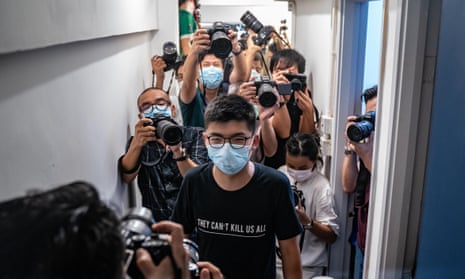Beijing’s assault on Hong Kong is unfolding at such a pace that the daily news has become a horror show of epic proportions. July began with the imposition of draconian national security legislation enacted sight unseen, even by Hong Kong’s leader, chief executive Carrie Lam. It ended with the sacking of a tenured professor, the arrests of four students for social media posts, the electoral disqualification of 12 pro-democracy politicians, the delay of legislative elections for a year and the issuance of arrest warrants for pro-democracy activists overseas under the new legislation.
In normal times, each of these acts would spark outrage and protests, but this onslaught has been too fast and too overwhelming to fully report, let alone counter, especially during a pandemic when gatherings of more than two people have been banned. Put simply, within a single month, Beijing has dismantled a partially free society and is trying to use its new law to enforce global censorship on speech regarding Hong Kong.
In delaying Hong Kong’s legislative elections, scheduled for September, the authorities are showing their disregard for external voices. The US secretary of state, Mike Pompeo, had warned that any delay would prove that China’s Communist party was turning Hong Kong into just another communist-run city. In Hong Kong, a democratic coalition cautioned that any postponement would mean the “complete collapse of our constitutional system”. Parsing its actions, Beijing’s intentions seem to be exactly that.
In the past year, millions of people have marched to protect those things that distinguish Hong Kong from China: the constitutional system that prizes an independent judiciary and the rule of law; competitive elections; the freedoms of speech, thought and assembly. The developments of the past week destroy even the semblance of those freedoms. The sacking of Benny Tai, a Hong Kong University law professor, for criminal convictions relating to the Occupy Central movement marks the end of academic freedom. The manner of his sacking, against the wishes of the university senate, highlights just how little autonomy academic institutions enjoy.
The late-night detentions in unmarked cars of four people, including a 16-year-old, on suspicion of inciting secession in social media posts were the first moves by the police’s new national security department. Although the four have been released on bail, the criminalisation of certain political posts and slogans heralds the advent of thought crime to Hong Kong.
Every day, the rules of political life are being drastically rewritten and the contours that are emerging are of a system that brooks no dissent. On Thursday, 12 pro-democracy politicians were disqualified from running for election, including four incumbent legislators generally seen as moderates. The reasons given show how far the authorities are willing to go to tame the legislature into compliance.
Activist Joshua Wong, who won the most votes in unofficial democratic primaries, says he was barred for using the #internationalbattlefront hashtag in Facebook posts. Some were excluded for actions taken before the national security legislation was even enacted. Others had applications invalidated for criticising the legislation or, in the case of the lawmaker Dennis Kwok, for vowing to vote down the government’s budget or other proposals. The new legislation even classifies “seriously interfering in, disrupting or undermining” the government’s business as subversion, which means filibustering could theoretically earn an elected politician life in prison. The very act of practising politics as normal could be a national security threat.
On Friday, Lam used colonial-era emergency regulations to delay the September elections for a year because of a recent Covid-19 rise. The suspicion remains that she is trying to buy time to avoid a stinging defeat of pro-government forces, following the landslide opposition victory in November, when pan-democratic forces won 17 out of 18 district councils.
The new normal is abnormal in the extreme, a city where library books have been pulled from the shelves and a protest song banned in schools. Beijing has lost patience both with Hongkongers and with the Hong Kong government’s own inability to restore order after months of sometimes violent street demonstrations. Before the national security law was introduced, Lam promised it would target only “an extremely small minority of illegal and criminal acts”, leaving the basic rights and freedoms of the overwhelming majority protected. The hollowness of these words reveals the impotence and irrelevance of her administration.
On Saturday, it emerged that Beijing is pursuing national security cases beyond China’s borders. Six pro-democracy activists overseas, including US citizen Samuel Chu, are facing warrants for their arrest for allegedly inciting secession and collusion with foreign forces. The act of lobbying overseas has effectively been criminalised. With this application of the law, Beijing is making it clear there are no red lines when it comes to speech about Hong Kong.
The exiled politician Nathan Law, now in the UK, has announced that he will cut off ties with his family in Hong Kong to protect them. The extraterritorial aspect of Beijing’s strategy echoes its actions targeting Uighurs in exile, and elements of the national security solution imposed on Xinjiang could foreshadow the government’s next steps. The law mandates the introduction of national security education in Hong Kong’s schools, as well as moves to strengthen the supervision and regulation of foreign media and the internet in Hong Kong. Foreign businesses, already spooked, may withdraw, but the events of the past month show Beijing’s determination to exact its will on Hong Kong, no matter the price.
One academic, Victoria Tin-bor Hui, has commented that writing about Hong Kong today is like writing obituaries one after the other. But Beijing might be overplaying its hand; the ferocity of its assault on Hong Kong’s freedoms can only re-energise civil society at home and may just prompt reluctant governments overseas into action in the interests of defending global freedoms.
